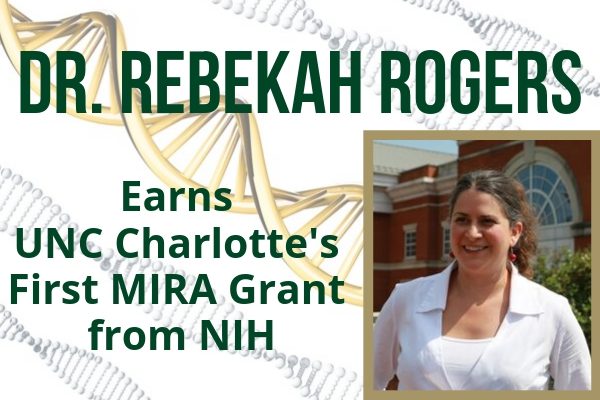Dr. Rogers Earns MIRA Grant

UNC Charlotte College of Computing and Informatics (CCI) Assistant Bioinformatics Professor, Dr. Rebekah Rogers, has been awarded a Maximizing Investigators’ Research Award (MIRA) grant from the National Institutes of Health (NIH) for her lab’s work studying complex gene mutations.
Spread over five years, the prestigious $1.83M grant is the first of its kind for UNC Charlotte.
Rogers, whose research generally focuses on genome evolution, has examined models using humans and mammoths, fruit flies and mollusks to answer a universal question: Why is the living world the way it is?
Larry Mays, CCI Bioinformatics and Genomics Chair and Professor, says, “The MIRA award is a good match for Rebekah’s approach. It is intended to provide maximum flexibility to two groups of outstanding scientists; established investigators and early stage investigators.”
With this grant, Rogers will study complex mutations as a source of evolutionary innovation that can form new genes, modify expression of existing genes, and contribute to the genetic basis of evolutionary change.
These mutations are known to be associated with multiple diseases in humans and to contribute to adaptive changes in natural populations. However, they remain understudied, as they can be more difficult to identify. Rogers’ proposal will fill the gap concerning complex mutations shaping natural variation and adaptation.
“It turns out that these mutations are really good at creating new genes,” Rogers says. “They can copy an entire gene, mix and match pieces of genes, or stick on-off switches next to regions that didn’t have genes before. They can also change when and where a gene is turned ‘on’ or ‘off’. We know that these mutations are sometimes important because they create new genetic material that helps animals adapt to new environments. They can also create new genes that do bad things instead of good things.”
Complex genetic mutations are important in the study of diseases like autism, cancer, immune disorders, and reproductive disorders.
“We know from some previous case studies that these mutations can sometimes do good things and help animals adapt,” Rogers says. “By studying where, when, and how these mutations do good things instead of bad bad things, we can start to figure out why some of them contribute to disease.”
Focused more on recognizing the researcher than the work itself, MIRAs are unique among NIH grants. “The funding is set up to be flexible and open for researchers to explore creatively,” Rogers says. “It supports the scientist instead of the project. It is the most prestigious grant for a new professor in evolutionary genetics and allows researchers to pursue high impact projects even if they are a little more risky. We hope it opens doors for our work on complex mutations and evolution.”
Reviewers noted that CCI’s well-established Bioinformatics expertise will be key to the project’s success. “It is nice to see those skills get recognition from our colleagues in the field of evolutionary genetics,” says Rogers.
For more News, Notes and Updates, Follow Us on Twitter.